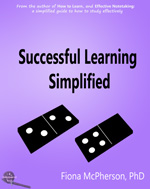You can predict how well a student will do from their use of study strategies. Forget intelligence. Forget hours put in. What’s important is the effective use of good study strategies.
To use a strategy effectively, you need to understand why it works, how it works, when it works and when it doesn’t.
For example, all students take notes — not everyone knows how to do it well. Research into the effectiveness of note-taking has found — surprise, surprise — that sometimes note-taking helps you remember information, and sometimes it doesn’t1.
Effective note-taking is more complex than simply knowing some strategies. Every learning situation is different. Every piece of text is different. Every lecture is different. It’s not enough to have a stock way of organizing your notes, and to try and push all the information that comes your way into that format. Sometimes a matrix structure might be best; sometimes a multimedia summary, sometimes a map, sometimes standard old linear notes. It depends on the information and it depends on how it is packaged.
The only way to know which strategy to use when, is to understand how they work.
For example, the primary value of note-taking is to select out the important information and connect it to other pieces of information. If you think the function of note-taking is simply to record what someone has said, or what you've read, then your note-taking will be far less effective.
- Baine, D. 1986. Memory and instruction. Englewood Cliffs, NJ: Educational Technology Publications.
